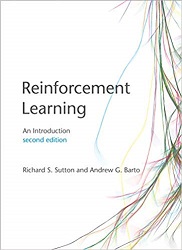
|
FreeComputerBooks.com
Links to Free Computer, Mathematics, Technical Books all over the World
|
|
- Title: Reinforcement Learning: An Introduction, Second Edition
- Author(s) Richard S. Sutton and Andrew G. Barto
- Publisher: MIT Press, Cambridge, MA, 2018; eBook (Creative Commons Licensed)
- License(s): CC BY-NC-ND 2.0
- Hardcover: 522 pages
- eBook: HTML and PDF (548 pages)
- Language: English
- ISBN-10: 0262039249
- ISBN-13: 978-0262039246
- Share This:

|
This book provides a clear and simple account of the field's key ideas and algorithms of Reinforcement Learning (RL).
Like the first edition, this second edition focuses on core online learning algorithms, with the more mathematical material set off in shaded boxes. The treatment to be accessible to readers in all of the related disciplines.
This book is the bible of reinforcement learning, and the new edition is particularly timely given the burgeoning activity in the field. No one with an interest in the problem of learning to act - student, researcher, practitioner, or curious nonspecialist - should be without it.
About the Authors- Richard S. Sutton is a Canadian computer scientist and a Professor of Computing Science and AITF Chair in Reinforcement Learning and Artificial Intelligence at the University of Alberta, and also Distinguished Research Scientist at DeepMind.
- Reinforcement Learning
- Machine Learning
- Neural Networks and Depp Learning
- Artificial Intelligence
- Statistics, Mathematical Statistics, and SAS Programming
- Probability and Stochastic Processe

- Reinforcement Learning: An Introduction, Second Edition (Richard S. Sutton, et al)
- The Mirror Site (1) - PDF
- The Mirror Site (2) - PDF
- The Mirror Site (3) - PDF
- Book Homepage (PDF, Errata, Code, Solutions, etc.)
-
 Mathematical Foundations of Reinforcement Learning (Shiyu Zhao)
Mathematical Foundations of Reinforcement Learning (Shiyu Zhao)
This book provides a mathematical yet accessible introduction to the fundamental concepts, core challenges, and classic Reinforcement Learning (RL) algorithms. Numerous illustrative examples are included throughout.
-
 A Course in Reinforcement Learning (Dimitri P. Bertsekas)
A Course in Reinforcement Learning (Dimitri P. Bertsekas)
The purpose of the book is to give an overview of the Reinforcement Learning (RL) methodology, with a particular focus on problems of optimal and suboptimal control, as well as discrete optimization.
-
 Reinforcement Learning: Theory and Algorithms (Alekh Agarwal)
Reinforcement Learning: Theory and Algorithms (Alekh Agarwal)
The purpose of the course is to give an overview of the Reinforcement Learning (RL) methodology, particularly as it relates to problems of optimal and suboptimal decision and control, as well as discrete optimization.
-
 Multi-Agent Reinforcement Learning (Stefano V. Albrecht, et al.)
Multi-Agent Reinforcement Learning (Stefano V. Albrecht, et al.)
The first comprehensive introduction to Multi-Agent Reinforcement Learning (MARL), covering MARL’s models, solution concepts, algorithmic ideas, technical challenges, and modern approaches.
-
 Algorithms for Reinforcement Learning (Csaba Szepesvari)
Algorithms for Reinforcement Learning (Csaba Szepesvari)
This book focuses on those algorithms of reinforcement learning that build on the powerful theory of dynamic programming. It gives a fairly comprehensive catalog of learning problems, describe the core ideas, etc.
-
 An Introduction to Deep Reinforcement Learning
An Introduction to Deep Reinforcement Learning
Deep reinforcement learning is the combination of reinforcement learning (RL) and deep learning. This field of research has recently been able to solve a wide range of complex decision-making tasks that were previously out of reach for a machine.
-
 Distributional Reinforcement Learning (Marc G. Bellemare, et al)
Distributional Reinforcement Learning (Marc G. Bellemare, et al)
Distributional reinforcement learning is a new mathematical formalism for thinking about decisions. This first comprehensive guide provides a new mathematical formalism for thinking about decisions from a probabilistic perspective.
-
 Reinforcement Learning and Optimal Control (Dimitri Bertsekas)
Reinforcement Learning and Optimal Control (Dimitri Bertsekas)
The purpose of the book is to consider large and challenging multistage decision problems, which can be solved in principle by dynamic programming and optimal control, but their exact solution is computationally intractable.
-
 The Hundred-Page Machine Learning Book (Andriy Burkov)
The Hundred-Page Machine Learning Book (Andriy Burkov)
Everything you really need to know in Machine Learning in a hundred pages! This book provides a great practical guide to get started and execute on ML within a few days without necessarily knowing much about ML apriori.
-
 Understanding Machine Learning: From Theory to Algorithms
Understanding Machine Learning: From Theory to Algorithms
Explains the principles behind the automated learning approach and the considerations underlying its usage. Provides an extensive theoretical account of the fundamental ideas underlying machine learning and the mathematical derivations.
-
 Foundations of Machine Learning (Mehryar Mohri, et al)
Foundations of Machine Learning (Mehryar Mohri, et al)
This book is a general introduction to machine learning. It covers fundamental modern topics in machine learning while providing the theoretical basis and conceptual tools needed for the discussion and justification of algorithms.
-
 Probabilistic Machine Learning: An Introduction (Kevin Murphy)
Probabilistic Machine Learning: An Introduction (Kevin Murphy)
This book is a comprehensive introduction to machine learning that uses probabilistic models and inference as a unifying approach. It is written in an informal, accessible style, complete with pseudo-code for the most important algorithms.
-
 Machine Learning Yearning (Andrew Ng)
Machine Learning Yearning (Andrew Ng)
You will learn how to align on ML strategies in a team setting, as well as how to set up development (dev) sets and test sets. After finishing this book, you will have a deep understanding of how to set technical direction for a machine learning project.





